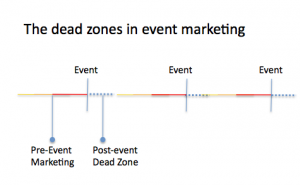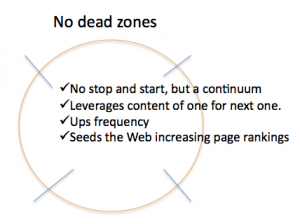EarthSayers.tv recently published to our Ecotourism special collection a selection from the presentations given at ESTC 2010, the EcoTourism and Sustainable Tourism Conference held here in Portland, September 8-10. Also published were interviews conducted at the conference by myself and filmmakers, Barry Heidt of SustainableTV and Erich Lyttle. Post production work was provided by Tom Hopkins of Sustainable Today TV. The sponsor of this event, The International EcoTourism Society (TIES), like others we have covered in the past, including the Seattle Green Festival held in June, was financed out of our own pockets. Why? Because most organizations sponsoring green events invest in “pre” conference marketing with the backend or post conference a dead zone with no budget. We think this is seriously inhibiting awareness and adoption of sustainability principles and practices which is the mission of EarthSayers.tv.
Viewing events, especially annual events, in a linear fashion in the age of Web marketing is inhibiting the growth of the sustainability audience and, ultimately, has a negative impact on attendance objectives for organizations sponsoring sustainability conferences and events.
The Web is a timeless environment and needs to be seeded with content frequently. Relevant and quality content remains king. However, accelerating the growth of an audience does requires the marketing process be viewed and acted upon as a continuum. Peppering the Web with content from one event to build interest in the next one should be understood as a requirement.
We bring to the sponsors of sustainable and green events not only the ability to produce content at an event in a more personal way – interviews as opposed to the pre-web practice of video taping presentations from the back of the room. We now are able to demonstrate the efficacy of our work as we not only produce content but provide the network, EarthSayers.tv, for distribution which along with our channel on YouTube. This positions the conference organizers and presenters as part of the sustainability movement and seeds the Web increasing page rankings for all involved and making the people and information easier to find. As we all know, searching is one thing, finding is another.



 The content map identifies four major elements of sustainability – Systemic Change, Planet, People, Prosperity – with twenty-three categories under these four elements. All keywords and phrases roll up to one of the elements e.g. consumerism (keyword) to culture and consciousness (category) to people (element).
The content map identifies four major elements of sustainability – Systemic Change, Planet, People, Prosperity – with twenty-three categories under these four elements. All keywords and phrases roll up to one of the elements e.g. consumerism (keyword) to culture and consciousness (category) to people (element).